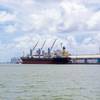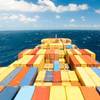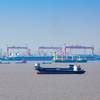“The container supply chains have become very reliable and efficient over the years, they are however under greater threat than ever before, not least due to terrorism, the introduction of new security measures, more extreme weather, piracy, strikes and a growing proliferation of unilateral port state regulations,” stated Dr Hans Payer, External Affairs Adviser to Germanischer Lloyd, at Containerization International’s 7th Annual Liner Shipping Conference in London today (April 22, 2004).
“If the great benefits wrought by containerization - including dependable, in-time delivery of goods in pristine condition - are not to be lost, it is essential that the container shipping industry and its regulators adopt the right mix of measures in response to these threats,” Dr Payer continued.
“Although affirmative action is required, a reasonable balance must be struck in order to preserve our cherished freedom of the seas and ensure that the least-costly, most practicable and effective course of action is taken. It boils down to a straight economic choice between building more slack into the delivery schedules to cope with contingencies or paying the price of maximum disruption caused by an inflexible approach.
Whichever way, the consumer will probably have to pay more in the long run and, whichever way, great challenges lie ahead.”
In one sense containerization is a victim of its own success in revolutionizing the supply chain through standardized transport units, computerized cargo tracking and automated transfer equipment. The container supply chain is geared to a smooth, non-stop flow of cargo door-to-door, and container ships are effectively “floating warehouses”.
Non-compliance with the new security regime would play havoc with the system that supports this impressive flow of goods and severely disrupt world trade. Thus, there is no question about how to deal with the new security threat; uniform implementation of the International Ship and Port Facility Security (ISPS) Code requirements on a global basis is essential.
While there is an element of government fait accompli with the rapid introduction of the new security controls, the container shipping industry must stand prepared to speak with a united voice when engaged in discussions with politicians and regulators on other, new rulemaking initiatives to ensure agreement on practicable solutions. In this respect, the proliferation of unilateral regulations by port states, such as the restrictions on ships and the routes they can follow imposed by the European Union (EU), France and Spain following the Prestige sinking, must be avoided in future. In his presentation Dr Payer stressed that the container shipping industry needs to work together with other maritime interests to ensure that all such rulemaking discussions take place within the international IMO forum.
The Germanischer Lloyd speaker also pointed out that the container shipping industry has it in its own hands to be proactive and introduce measures, through contingency planning, that will reduce the impact of these modern threats and help pre-empt the possibility of punitive legislation.
Such measures include building alternative discharge ports into voyage plans; continued development of weather routing technologies, container lashing systems and modified ship designs; routing ships away from potential trouble spots; and improving communications all along the container transport chain. On ship design, for example, Germanischer Lloyd has significantly increased the design loads for container ships with large bow flare and has instructed ship-owners and operators to pay attention to the danger of slamming. The best response to date is for the officers to reduce speed in bad weather and avoid heavy bow flare impacts.
“Implementation of these contingency measures, as well as strict compliance with the new security code and greater cooperation between industry and government on new rulemaking initiatives, will help containerization achieve and retain its full potential,” concluded Dr Payer.
“The container ship fleet, with 3,200 fully cellular vessels totaling 60 million gross tons (gt), is the fastest growing sector in world shipping. The container ship fleet now accounts for more than 12 per cent of the merchant tonnage worldwide, up from 5 per cent only eight years ago. Approximately 75 per cent of general cargo is already containerized, and this share is expected to grow to more than 90 per cent by 2010.”
Sponsored Content
Chris-Marine’s solutions help to prolong engine lifetime

Subscribe for
Maritime Reporter E-News
Maritime Reporter E-News is the maritime industry's largest circulation and most authoritative ENews Service, delivered to your Email five times per week









